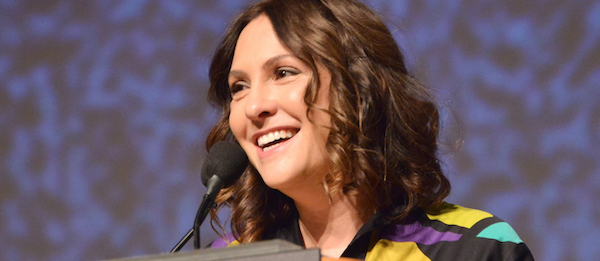“Things should happen that surprise you.”—Jill Soloway Gets “Inspirey” at the Forum

Jill Soloway delivered on her promise at the start of her keynote at this past weekend’s Film Independent Forum to give a talk that would be “inspirey and motivatey”—partly because she did that thing most great speakers do: she was brutally honest about the rock-bottom moments of doubt, failure and humiliation that preceded her celebrated status today. It was also partly due to the kernels of wisdom she was able to pluck from her personal experience and share—the kind of Oprah-esque directives that ring so right and true that just hearing them spoken out loud makes you feel that you’ve imbibed a magic bullet that will transform you into someone who can—and will, goddam it!—begin to make miracles from the second you step foot out that auditorium door.
But mostly, Soloway’s talk was inspirey and motivatey due to the sheer fact that this super-funny, talented, innovative woman was simply standing there on stage—living, breathing, fabulous-tight-wearing proof that creativity and smarts and vision and perseverance really are rewarded, at least sometimes, in the world of television and film.
Soloway’s confessional of rock-bottom moments began with learning that her pilot script about Laurel Canyon in the sixties had been rejected by HBO. “But-but-but – what about that other thing I just read about in the trades that is getting shot? Someone named Lena Dunham?,” she whined to her agent. “Oh, that,” he said. “That’s part of this low budget initiative. I wouldn’t worry, nothing’s going to come of that.”
She continued her I-nearly-threw-in-the-towel arc with the story of being bypassed during staffing season. After a “they-love-you!” meeting, after “the words actually spoken by my actual agent were ‘pop’ and ‘the’ and ‘champagne,’” Soloway spent days awaiting the offer, ultimately deducing from the radio silence that the offer wasn’t forthcoming after all. “Um, so, yeah,” her agent told her, “apparently they asked around about you and word came back that you’re difficult.”
The last humiliation revolved around what Soloway called “the meanest review in the world.” She’d responded to the staffing season incident by deciding to first make a short and then a feature that would get into Sundance. She did just that. Afternoon Delight premiered at the Eccles in Park City. Said Soloway, “I danced my head off, wild and free and full of the feeling that I’d made it. I wish I could describe that moment as a Cinderella moment, as the peak of a mountain, a peak that propelled me here, but I can’t. Two days after that premiere, the meanest review in the world came out. It seemed to cast a chill on any kind of bidding war that had started. I was at bottom, sick with the flu and hiding for hours under my pillow mid-day in my condo. I had one of those 4:00 pm paralyzing day-mares that I died. An actual dream that I died; my body in the drawer at the morgue.”
Of course, we all know the end of the story. Soloway won the Sundance Directing Award for Afternoon Delight, and perhaps even more importantly she said, “my movie was that thing I needed–a way for people to see my voice.” She told Joe Lewis at Amazon that as writer-director-producer, she could guarantee that her next project, a pilot, would have that same tone. Thus, Transparent was born.

Soloway’s inspirey and motivatey directives stemmed mostly from her experience of learning to direct, of developing a technique. The first, she called “being in the flow: Show up with your body as your tool, not your mind. Feel things as the artists around you work, use those feelings to know what’s working. From the moment you say action, this is the fun part–things should happen that surprise you, excite you, scare you, turn you on, make you laugh. If things aren’t surprising you, when you say cut, whisper things to the actors that will make them do things that do surprise you. For me, being in the flow means bringing the feminine to the workplace by thinking about filmmaking as throwing a party. All you have to do is be willing to create a vibe that allows people to feel free and try things they’ve never tried before.”
Another piece of advice: “You need a technique, whether you make it up or learn it.” Soloway developed hers through a filmmaking lab run by Joan Scheckel. It’s a technique, she said, “that can be very simply boiled down to the question: ‘What are you doing to get what you want?’ It’s a question I learned to ask of a character – what are they doing to get what they want – in this movie or sequence or scene or beat or moment. It can also be asked of the cinematographer – what does the camera want? The props, the art direction, the light, all of these elements should be doing something. They should want something.” Soloway says because the audience sits in a chair, watching, “they crave seeing someone doing something. That is the thing that makes it watchable, that keeps them in their chair.”
“Have fun,” Soloway also instructed. “Reverse the polarity of the experience. In a world where the rallying cry is, ‘we’re running out of time, we’re running out of money, we’re running out of light,’ I operate with the feeling that there is plenty of time and plenty of money and light is everywhere, bouncing off of every surface.”
“Be willing to lead,” she encouraged, reading a quotation from a John Cassavetes manifesto she said she read “like scripture” every morning while she was making Afternoon Delight. “The artist is an irreplaceable figure in our society. An artist is a person who can speak their own mind, who can reveal, educate and stimulate and in every sense, communicate with fellow human beings. It is a privilege to communicate worldwide in a world so incapable of understanding. The answers cannot be left in the hands of the money men. The answers must come from the artist herself. She must become aware that art and the respect due this vocation is her responsibility, and that if she cannot garner the respect, the fault is her own. She must therefore make the producer realize by whatever means are at her disposal – that only by allowing the artist full and free creative expression – will the art and business of motion pictures survive.”
“Cassavetes didn’t say, ‘she,’ he said, ‘he,’” Soloway admitted, “but whatever.”
Pamela Miller / Website & Grants Manager